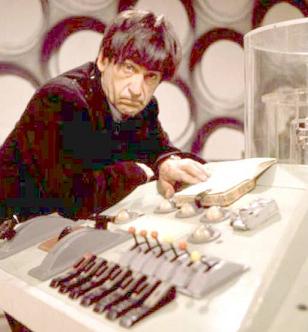Doctor Who: 50 Years Through Time And Space
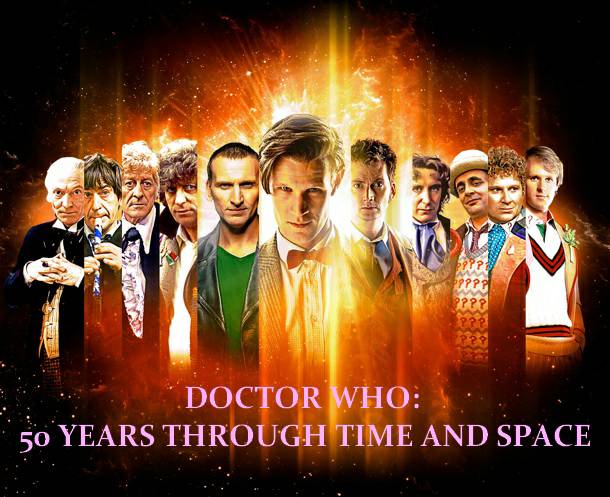 I cross the void beyond the mind, the empty space that circles time. I see where others stumble blind, to seek a truth they never find. Eternal wisdom is my guide, I am the Doctor.
I cross the void beyond the mind, the empty space that circles time. I see where others stumble blind, to seek a truth they never find. Eternal wisdom is my guide, I am the Doctor.
– Jon Pertwee’s lyrics from the 1972 novelty record Who is the Doctor?
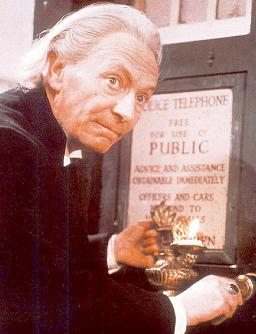
William Hartnell as the Doctor who started it all.
The British television program Doctor Who has become one of the longest lasting and best loved series in television history. Its path to glory has not always been smooth but it has been paved with enough ingenuity and uniqueness to garner it a loyal legion of fans and a popularity that has waned at times but never gone completely out of style. As the show approaches its landmark fiftieth anniversary, it seems only fitting to take a brief look back at its history and what made it the cult phenomenon it is today.
The Doctor Who television series began life in Britain on Saturday, November 23, 1963, the day after President John F. Kennedy was tragically assassinated in America. As originally envisioned, the series was to showcase the adventures of a grandfather and granddaughter time travelling duo and two of the latters’ teachers in a historical, and therefore educational, context. The first four chapter serial is fairly indicative of the original concept as the group interacts with cave people in prehistoric times. It’s also pretty dry and dull. It was the second serial, The Daleks, which introduced the unique alien creatures of the title, sent the show’s ratings soaring, and had most of the children in England chasing each other while yelling exterminate! Ironically, The Daleks script epitomized almost everything the show’s producers did NOT want to see in a story but it was only one completed in time to begin production. At the conclusion of the second serial, the show’s direction and popularity was sealed.
Doctor Who did not abandon the historical stories completely but they took a back seat to more science fantasy productions. This led to the expansion of The Doctor’s character and his time machine the TARDIS (an acronym for Time And Relative Dimensions In Space) which looked suspiciously like a 1960’s English police call box thanks to a faulty chameleon circuit. During the first few formative years of the show, the Doctor became more endearing and less pompous towards both his companions and the audience and he began to grow more into the lovable eccentric that continues to this day. Unfortunately, by the end of the third season it was becoming obvious that lead actor William Hartnell’s health could no longer tolerate the day to day grind of series television but the writers came up with an ingenious concept to solve the problem – regeneration.
On October 29, 1966, at the conclusion of the final episode of the third season of Doctor Who (The Tenth Planet which was also the debut of the Doctor’s second most popular adversary, the Cybermen), the Doctor staggered exhaustedly into the TARDIS and collapsed. Before the astonished eyes of his companions while the familiar sounds of the TARDIS materializing / dematerializing were heard, the Doctor’s body blurred and he seemed to become an entirely different person! Since the very beginning of the series, it was known that the Doctor belonged to an ancient race of alien beings later to be identified as the Time Lords. The show’s writers used this background information to create the concept of renewal, as it was called at first, and later regeneration. It was eventually revealed that all Time Lords could regenerate twelve times and this was presumably The Doctor’s first time.
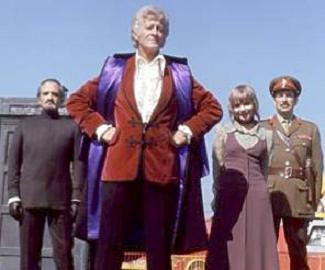
Jon Pertwee made Doctor #3 a more dashing hero.
Patrick Troughton assumed the role of the Doctor full time in the first episode of the fourth season, Power of the Daleks, which trotted out the popular villains just as insurance to remind the audience this was still the same show. Troughton kept very little of William Hartnell’s personality in his characterization, aside from some seemingly self-imposed mystery, and instead made the character much more affectionate and almost comical. While the second Doctor could appear easily frustrated and even bumbling at times, this always gave way to some cunning plan or clever idea that would usually catch the enemy completely off guard and save the day. The audience embraced the regeneration concept and the idea that there could be many different Doctors who were all really the same being at heart as the show continued to win in the ratings.
After filling the role for three years himself, Patrick Troughton departed the show in the final story of the sixth season, The War Games, to avoid type casting as a science fiction actor. The War Games not only ushered in a third Doctor but also put the Time Lords on screen for the first time, officially named them, and gave some much needed background into why the Doctor had been on the run from his own race. In the tenth and last episode of this epic serial, the Time Lords finally catch up to the errant Doctor and force him to return to his as yet unnamed home world to stand trial. As punishment for violating their rule against interfering with other races and stealing one of their time machines, the Doctor is exiled to the planet he has shown the most fondness for, Earth, and forced to regenerate so that he will not be recognized. It was a wonderfully clever set up for the next era of Doctor Who.
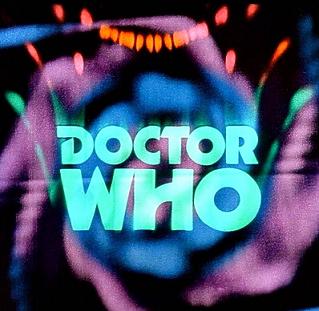
The full color opening credits that brought Doctor Who into the 1970's.
Doctor Who entered the 1970’s with a new actor in the lead role and in color. Jon Pertwee managed to combine some of the more endearing traits of his predecessors while still making the third Doctor his own unique character. This was an action oriented Doctor who was skilled in hand to hand combat and had a penchant for gadgets and machinery. After arriving on Earth disoriented from his forced regeneration, the third Doctor quickly allied himself with UNIT, the United Nations Intelligence Task Force, whom he had assisted on two previous occasions. His position as their “unpaid” Scientific Advisor, allowed him access to the best technology the Earth had to offer and his only hope of repairing his deactivated TARDIS. If he helped to protect his imposed home in the process of trying to escape it, that was just a bonus.
The Earthbound stories that began with the seventh season of Doctor Who were designed to help offset the costs incurred by the new color filming as well as improve the ratings. They succeeded in both instances but almost from the beginning the show’s writers tried everything they could to get around this limitation. In the opening story of the tenth season, The Three Doctors, the Doctor was finally given his freedom by the Time Lords after he and his two previous incarnations helped save their home planet, still unnamed, from the renegade Time Lord Omega. While he would make many intergalactic trips over the next two years, the third Doctor still stuck close to his favorite planet for the remainder of his tenure.
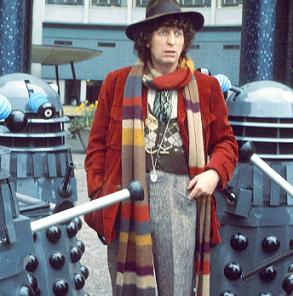
Tom Baker as the most popular Doctor of all, #4, surrounded by Daleks.
By the conclusion of the eleventh season, Doctor Who had undergone many cast and crew changes since the third Doctor’s run had started and Jon Pertwee decided his time on the show had come to an end as well. Tom Baker, an actor fifteen years younger than Pertwee, was cast to play an even more active Doctor and hopefully appeal to a new generation of viewers. His first two seasons seem very much like the Pertwee years of the show with many Earth bound stories and familiar faces. By season fourteen though Baker’s character had firmly broken out on his own and the show was enjoying a huge resurgence in popularity. During Tom Baker’s reign the Doctor would challenge old enemies, travel with a whole gang of companions including a fellow Time Lord, and even adopt a robot dog, K-9, as his friend and mascot.
Tom Baker remained with the series longer than any actor before or since, racking up an impressive seven seasons that doubled the tenure of many of his fellow Doctors. During this time he had almost single handedly revived the series in England and helped it finally become established in America thanks his quirky portrayal of the title character. His final season, the show’s eighteenth, had also coincidentally brought in a new production team on the program that would begin to systematically dismantle many of the elements the show had spent close to two decades establishing. By the first episode of the nineteenth season, Peter Davision took over the lead role and the only recognizable face in the program was the TARDIS!
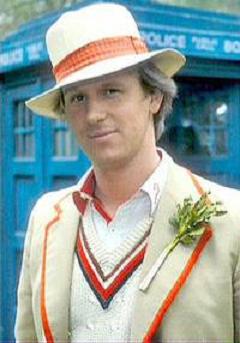
Doctor #5, Peter Davison, a younger and more aristocratic incarnation.
Davison tried to distance his Doctor from Tom Baker’s by making him more of an English aristocrat in the more serious vein of William Hartnell. This characterization made him hard to read and difficult to fit in with his companions. The stories became dryer and less memorable so much so that even trotting out a few classic villains and surprise reappearances couldn’t save them from mediocrity. The one true bright spot during Peter Davison’s tenure was the twentieth anniversary special, The Five Doctors, which managed to reunite all five incarnations in one story even if the first Doctor had to be portrayed by a new actor and Tom Baker appeared only in stock footage from an uncompleted serial.
After a three year roller coaster ride, due in part to scheduling changes that initially helped and then began to hinder the show’s ratings, Peter Davison decided to hang up his sonic screwdriver and call it quits. He was replaced by Colin Baker, an actor who had actually appeared as a different character in an earlier Davison story, and things began to be put back on track. The sixth Doctor returned to many of the eccentricities of his predecessors but still maintained a more serious tone. This darker Doctor was not popular with the child friendly higher ups at the BBC but the fans were beginning to embrace him. Unfortunately, following season twenty-two which was Baker’s first full season as the Doctor, Doctor Who was placed on what ended up being an eighteen month hiatus due to what was officially announced as “scheduling changes” but ultimately amounted to a cancelation reprieve.
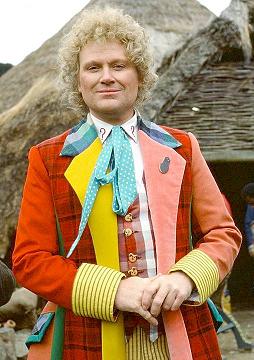
Colin Baker was Doctor #6 but never got the chance he deserved to play the character.
When the show finally did return for the twenty-third season, it’s mish-mash of reworked serials were crammed into an ill-fitting story arc called The Trial of a Time Lord which just further injured the already wounded series. Just as things were starting to settle down again, it was announced that Colin Baker’s three year contract to play the Doctor would not be extended even though he had only been on screen for barely half that time. Baker was unfairly ousted after making a more than valiant attempt at breathing new life into the character and fans were deprived of an opportunity to see where this might have eventually led.
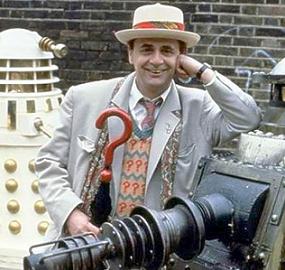
Sylvester McCoy as the last of the classic Doctors, #7.
With the rating understandably sagging thanks to the scheduling turmoil and weak stories, Doctor Who was once again sidelined for nine months while the mess was sorted out and a new lead was found. Sylvester McCoy, a character actor best known for comedic roles, was cast as the seventh Doctor in the hopes that he would add a lighter tone to the character. This was the case at first but many of the stories during this time dealt with disturbing elements that drew the show back into darker territory. A recurring theme also hinted at the Doctor having led many previous lives, some of which were still haunting him. Without being able to find his own niche in the series, the seventh Doctor failed to catch on with audiences and at the end of his three year contract, Sylvester McCoy was also not renewed and this time the show went with him.
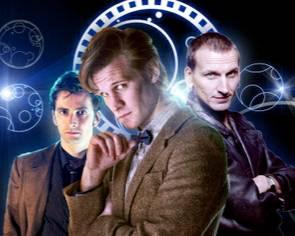
The new Doctors David Tennant, Matt Smith, and Christopher Eccleston.
After twenty-six seasons, the classic Doctor Who program fans had come to know and love was unceremoniously canceled. Fans were stunned by the cancelation but not really surprised after the poor treatment the show had received in recent years and uneven writing. Interest in the series was maintained through repeat broadcasts in America and fan productions of both audio and video stories. 1996, seven years after the cancelation of the series, saw Doctor Who return as a lackluster television movie that cast Paul McGann as a likeable if unremarkable eighth Doctor but the story did more to harm the series than it did to advance it and is predominantly better off forgotten.
Doctor Who finally received the re-launch it deserved in 2005 with a bitter and battered ninth Doctor, excellently portrayed by Christopher Eccleston, having emerged the supposedly sole survivor of a time war that wiped out both the Time Lords and the Daleks. This was just the slap in the face the show needed to wake up viewers and a new era of Who-mania was launched. Since that time, two other actors have stepped in to play the tenth and eleventh Doctors, David Tennant and Matt Smith respectively, and a twelfth Doctor, Peter Capaldi, stands patiently on the horizon. The new Doctor Who series has risen magnificently from the ashes of the old one with its continuity firmly intact while still blazing new and interesting territory.
Today the Doctor Who series has reached a milestone as it arrives at its fiftieth anniversary on Saturday, November 23, 2013. It may not have had a continual run during that time, but it was in production for over thirty-three of those years which is more than most television series can boast. It has become one of the longest lasting and most endearing series of all time, perhaps second only to Star Trek in fan popularity. While much of this has been due to the talented actors who have put their spins on the Doctor, it is also due in large part to unique concepts and well written stories that hold up to repeated viewing. These same nuances could conceivably keep Doctor Who traveling through time and space for another fifty years or more if they can maintain the high standards they have set for themselves. Hopefully Capaldi’s twelfth Doctor will take things in his own novel direction and give the show a fresh boost to keep it going but, as Doctor Who has taught us, only time will tell.

